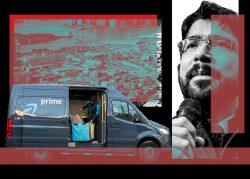Not long ago, two-day delivery was revolutionary for internet retailers. Then two hours became the gold standard. Now there are startups like Jokr, which aims to get consumers everything from a single ingredient to a full grocery haul within 15 minutes.
To meet this logistical challenge, these companies need a lot of real estate close to customers in the markets they target. That is providing a welcome boost to the industry after the pandemic decimated much of New York City’s brick-and-mortar retail.
“The last year further accelerated the shift to online grocery shopping,” said Tyler Trerotola, U.S co-founder of Jokr, a big rapid-delivery player helping to power the trend.

Jokr co-founders Tyler Trerotola and Aspa Lekka
Jokr recently opened a 3,000-square-foot “dark” store — meaning not open to the public — at 11 Dutch Street in the Financial District, according to its COO, Aspa Lekka. It now has 10 micro-warehouses in New York and 106 in 10 cities worldwide.
And it’s not done. Lekka said she expects to have 80 to 100 in the Big Apple within the next 12 months. The New York-based company, which counts SoftBank, Tiger Global, GGV Capital and Balderton Capital as investors, raised a $170 million Series A round shortly after its launch in March.
As more consumers turned to online food shopping during the pandemic, many traditional stores suffered. Pre-Covid, online orders accounted for 2 to 3 percent of grocery sales, according to data provided by Rick Weinberg, an executive vice president at CBRE who represents grocery store tenants Albertsons and Ahold USA (Giant, Stop & Shop). Now they are 10 to 12 percent, and projections are as high as 20 percent.
Another fast-delivery firm, Philadelphia-based Gopuff, has also been signing deals for dark supermarkets in New York City, according to a company spokesperson. The spaces will open — or, rather, start operating — later this year.

Gopuff co-founders Rafael Ilishayev and Yakir Gola
Gopuff has more than 500 micro-facilities delivering to customers in over 1,000 cities. The company is rapidly growing across the U.S. and Europe, while offering other services such as fresh-made meals and beer, wine and spirits in many American cities through acquisitions of two liquor store chains.
Founded in 2013, Gopuff has seen orders and sales grow by at least triple digits each year, according to the spokesperson. The company raised another $1 billion this summer, bringing its valuation to $15 billion. Blackstone’s Horizon platform and Guggenheim Investments joined with existing investor Softbank Vision Fund 1 and others in the round.
Landlords with a surplus of space in low-profile locations are readily leasing it to such new types of tenants. Maybe too readily.
“I think the market might get saturated if there are too many of them,” said Robin Abrams, a commercial broker and vice chairman at Compass who is negotiating to represent a big international speedy-grocery store business for its U.S. rollout. “But, I think they can co-exist with the Fairways and the Whole Foods because it seems like a different model. [Ultimately], I don’t know that they’re going to replace the larger stores.”
Read more


MaxDelivery, an established speedy-grocery business, has occupied 11,000 square feet on the ground floor at GFP Real Estate’s 318 West 39th Street since 2015. Jeffrey Gural, chairman of GFP, said his firm has had a good relationship with MaxDelivery, which delivers groceries, drugs and gourmet foods in under one hour for free for orders over $125.
“It’s an interesting business,” Gural said. “I’ve been there. They have people that get a slip of paper running through the store, picking out the stuff and putting it in a bag. … They hand it to a guy who has a bicycle and he delivers it.”
MaxDelivery general manager David Mendez did not respond to a request for comment.
The phenomenon is driven by demand for convenience, which Covid accentuated but did not create.
“Way before the pandemic, people were lazy, myself included,” said James Famularo, president of New York retail leasing at Meridian Capital Group, who is negotiating on-demand grocery delivery deals on landlords’ behalf for six spaces in Manhattan, Brooklyn and Queens.
Lekka hopes her company will eventually replace supermarkets by offering a personalized, faster experience and using space much more efficiently.
“By understanding what is the right assortment to carry at each hour of the day, and day of the week, we will be able to not only carry enough products, but also the most relevant products,” the Jokr founder said. “We do believe online grocery can be a much better experience compared to the traditional one.”
Another competitor looking to eat up market share is Brooklyn-based Fridge No More, which has raised $15.4 million in a Series A round led by venture capital firm Insight Partners. The grocery e-commerce business, which offers 15-minute free delivery and no minimums, has two Brooklyn outposts spanning 3,000 square feet apiece, according to GroceryDive, and reportedly plans 40 or more fulfillment hubs across the city. Fridge No More did not respond to a request for comment.
In May, a grocery delivery startup out of Europe launched its U.S. operations. The unicorn, Gorillas, says it provides 10-minute delivery service in various Brooklyn and Manhattan neighborhoods and plans to expand in the five boroughs and beyond.
Gorillas has raised $290 million in a Series B, and it claims it has become Europe’s fastest unicorn ever. Investors include Fifth Wall and Greenoaks Capital Partners. A spokesman for Gorillas declined to provide information.
Then there is 1520, which launched in January. Operating in Manhattan below 96th Street and in parts of Queens, it promises deliveries in 15 to 20 minutes (hence the name). The company is on the hunt for spaces of 1,500 to 2,000 square feet, said co-founder and CEO Oleg Shevlyagin, and aims to sell pre-made meals in addition to groceries and other household essentials. The startup raised $7.8 million in a seed round led by Greycroft, OneWay Ventures and Flint Capital.
These firms say they can carve out an existence alongside online grocery giants such as Amazon Fresh and Instacart as well as national and regional grocers that deliver through partnerships with tech companies.
“We deliver groceries within 10 to 20 minutes, for free,” 1520’s Shevlyagin said. “Instacart and Amazon Fresh need to be ordered hours or days in advance and they also charge a delivery fee.”
The company also says it avoids out-of-stock issues and having to substitute items, as sometimes happens to stores that rely on third parties for fulfillment.
Still, one broker, who requested anonymity because he works with grocery delivery services, said, “My gut tells me Amazon will see the market share and then crush them and it will all fold.”
Morris Sabbagh, president of Kassin Sabbagh Realty, which represents Jokr in its search for 2,500- to 5,000-square-foot U.S. storefronts, begs to differ.
“I think that Amazon is most likely aware and would have to drastically shift their business model in order to properly compete,” Sabbagh said. “However, at the rate that Jokr is growing, it would be almost an impossibility for them to be ‘crushed.’”
John Catsimatidis, the owner of the Red Apple Group, which operates Gristedes and D’Agostino supermarkets, said that while they deliver groceries, they are losing some business to the pure e-commerce businesses and are having to think about a different model.
“In Manhattan we’re becoming more convenience stores and we’re going to be offering electronic shopping ourselves,” Catsimatidis said.
Weinberg, of CBRE, thinks large e-commerce companies will not even try to challenge the speedy-delivery businesses.
“Many larger national and regional grocers already partner with e-commerce/tech companies to develop proprietary, off-site, automated or semi-automated fulfillment operations,” Weinberg emailed. “The speedy delivery model is a different concept.”
